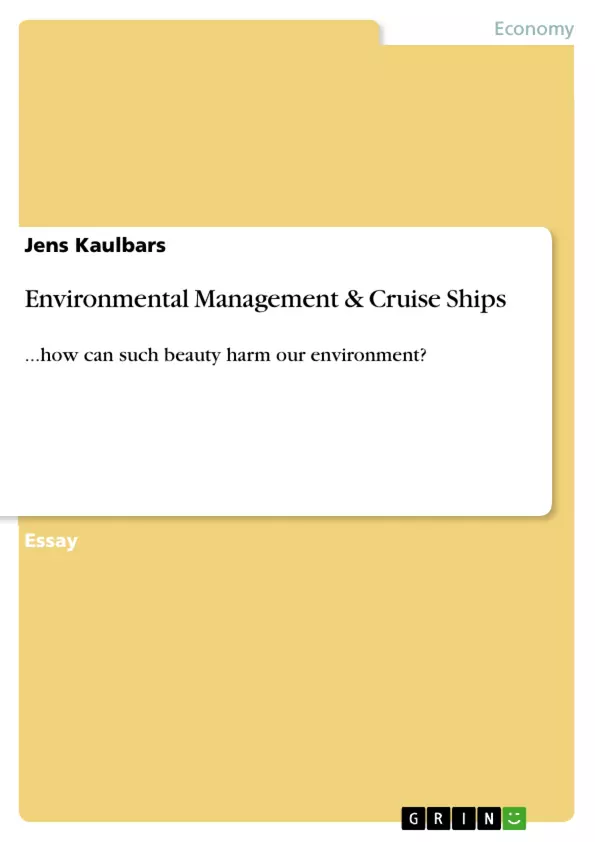One of the currently most important topics worldwide is the environment: mankind gradually destroying its natural surroundings at an alarming pace; and what can be done to prevent our environment from meeting its premature fate, which is closely tied to the one mankind will face. Thus protecting the environment means preserving the human race.
As an issue affecting every part of life, it is not surprising that the tourism industry has to deal with effective environmental management as well, considering the best possible practice to balance environmental healthy actions with profit raising. Moreover, as leisure industry tourism is under immense pressure, because it is not considered essential, remaining classified as a luxury good (Hayes, 2004), although most people won’t necessarily agree with this anymore. Nevertheless it therefore provides an easy target for the attacks of environmental activists.
This alone, generating a bad reputation, and not even considering ethical aspects, makes it clear that environmental management in tourism is very important. In the end, breeding cattle or growing rice maybe more devastating for the environment, but plays a rather crucial part in maintaining life. Whereas it seems obvious that for example flying around the globe to a variety of destinations cannot possibly be as essential in retaining life on earth.
Another issue that needs to be taken into consideration is the marvellous marketing effect positive environmental management creates. Most people love doing something good and protective for “their” environment while having a great time being on vacation.
The solution, so it seems, are environment-caring types of holidays. And if the modern forms of spending vacation are harming the environment, why not coming back to more traditional types of holiday? Why not go by ship instead of taking a polluting flight? And why not take the next step, go on a cruise?
After all cruises bear a shiny white image and are widely considered not to be that harmful to the environment as other vacation activities the press is always writing about. But does this mean the environmental impacts of cruise ships are not as negative? Are there any at all?
Inhaltsverzeichnis (Table of Contents)
- Environmental Management & Cruise Ships
- Environmental Management in Tourism
- Cruise Ships and the Environment
- Regulations and Enforcement
- Impacts of Cruise Ships on the Environment
- Waste Management
- Water Management
- Energy Management
Zielsetzung und Themenschwerpunkte (Objectives and Key Themes)
This text explores the environmental impacts of cruise ships, highlighting the challenges and potential solutions for responsible environmental management within this industry. The focus is on understanding the complex interactions between cruise ship operations, environmental regulations, and the delicate balance of marine ecosystems.
- The environmental impact of cruise ships on oceans and marine life
- The role of regulations and enforcement in managing environmental risks
- The challenges and opportunities in waste management, water management, and energy management on cruise ships
- The need for technological advancements and operational practices to minimize environmental damage
- The balancing act between economic development and environmental sustainability in the cruise industry
Zusammenfassung der Kapitel (Chapter Summaries)
- This chapter introduces the concept of environmental management in the context of the cruise industry, highlighting the need for responsible practices due to the industry's significant impact on the environment. It emphasizes the importance of balancing economic growth with environmental protection.
- This chapter delves into the specific challenges of environmental management within the cruise industry, focusing on the regulations and enforcement mechanisms that govern waste disposal and other environmental impacts. It explores the complexities of international agreements and the limitations of enforcement, particularly in the context of cruise companies operating under flags of convenience.
- This chapter examines the various environmental impacts of cruise ships, encompassing their effects on oceans, marine life, and coastal ecosystems. It discusses issues such as pollution from sewage, ballast water, and vessel emissions, as well as the disruption of marine habitats due to anchoring, noise, and vibrations.
- This chapter focuses on waste management practices on cruise ships, exploring the different types of waste generated and the challenges associated with their treatment and disposal. It discusses various methods of waste management, including incineration, recycling, and discharge at sea, and examines the complexities of balancing waste disposal with environmental regulations.
Schlüsselwörter (Keywords)
The primary focus of this text is environmental management within the cruise industry. Key concepts and topics include environmental impact, waste management, water management, energy management, regulations, enforcement, marine pollution, coral reefs, ballast water, vessel emissions, and sustainable tourism.
Frequently Asked Questions
What are the main environmental impacts of cruise ships?
Key impacts include pollution from sewage, ballast water, vessel emissions, and the disruption of marine ecosystems like coral reefs.
How is waste managed on modern cruise ships?
Cruise ships use methods like incineration, recycling, and sometimes discharge at sea, depending on international regulations and technology.
What are "flags of convenience" in the cruise industry?
It refers to ships registered in countries with lax environmental or labor regulations, making international enforcement of standards difficult.
Is cruising more environmentally friendly than flying?
While often perceived as "clean," cruise ships have significant carbon footprints and generate vast amounts of waste compared to other holiday types.
What role does water management play on ships?
Water management involves treating "grey water" (showers/sinks) and "black water" (sewage) before discharge to prevent marine contamination.
- Quote paper
- Jens Kaulbars (Author), 2008, Environmental Management & Cruise Ships, Munich, GRIN Verlag, https://www.grin.com/document/92846



